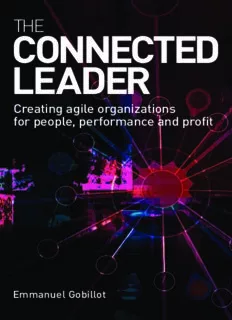
The Connected Leader: Creating Agile Organizations for People, Performance and Profits PDF
Preview The Connected Leader: Creating Agile Organizations for People, Performance and Profits
THE CONNECTED LEADER Creating agile organizations for people, performance and profit Emmanuel Gobillot i THE CONNECTED LEADER ii This page intentionally left blank iii THE CONNECTED LEADER Creating agile organizations for people, performance and profit Emmanuel Gobillot London and Philadelphia iv Publisher’s note Every possible effort has been made to ensure that the information contained in this book is accurate at the time of going to press, and the publishers and authors cannot accept responsibility for any errors or omissions, however caused. No responsibility for loss or damage occasioned to any person acting, or refraining from action, as a result of the material in this publication can be accepted by the editor, the publisher or the author. First published in Great Britain and the United States in 2007 by Kogan Page Limited. Reprinted in 2007 Apart from any fair dealing for the purposes of research or private study, or crit- icism or review, as permitted under the Copyright, Designs and Patents Act 1988, this publication may only be reproduced, stored or transmitted, in any form or by any means, with the prior permission in writing of the publishers, or in the case of reprographic reproduction in accordance with the terms and licences issued by the CLA. Enquiries concerning reproduction outside these terms should be sent to the publishers at the undermentioned addresses: 120 Pentonville Road 525 South 4th Street, #241 London N1 9JN Philadelphia PA 19147 United Kingdom USA www.kogan-page.co.uk © Emmanuel Gobillot, 2007 The right of Emmanuel Gobillot to be identified as the author of this work has been asserted by him in accordance with the Copyright, Designs and Patents Act 1988. ISBN-10 0 7494 4830 X ISBN-13 978 0 7494 4830 1 British Library Cataloguing-in-Publication Data A CIP record for this book is available from the British Library. Library of Congress Cataloging-in-Publication Data Gobillot, Emmanuel. The connected leader: creating agile organizations for people, performance and profit/Emmanuel Gobillot. p. cm. ISBN 0-7494-4830-X 1. Leadership. 2. Self-actualization (Psychology) I. Title. HM1261.G63 2006 303.3‘4--dc22 2006013362 Typeset by Datamatics Technologies Ltd., Chennai, India Printed and bound in Great Britain by Creative Print and Design (Wales), Ebbw Vale v To Charlotte and George vii Contents Acknowledgements xi Introduction 1 Part One: The case for connections 11 1. What do people want? 13 What drives engagement and why does it matter? 14; How is the nature of engagement changing? 17; What are the new rules of engagement? 20; The 30-second recap 26; The leadership takeaway 28 2. How do organizations respond? 31 How do organizations and individuals become disconnected? 32; What does an organization designed for engagement look like? 43; The 30-second recap 48; The leadership takeaway 51 Diagnostic tools 1: Do you know what people want? 53 viii Contents Part Two: The case for connected leadership 61 3. What must leaders do? 63 What do leaders do? 64; What impact do leaders create? 69; The 30-second recap 77; The leadership takeaway 78 4 How can leaders succeed? 81 How do leaders achieve high performance in the people economy? 82; What is different about the new high-performing leadership recipe? 86; The 30-second recap 96; The leadership takeaway 98 Diagnostic tools 2: Are you ready to respond? 99 Part Three: The levers of connected leadership 109 5. How to connect through trust 111 Why is trust critical to connected leaders? 112; How do connected leaders create and sustain trust? 117; Becoming a trusted channel 118; Exercising thoughtful influence 121; Having concern for impact 123; The 30-second recap 125; The leadership takeaway 127 6. How to engage through meaning 129 Why is meaning critical to performance? 130; How do connected leaders co-create meaning? 137; Having no boundaries 138; Doing the groundwork 140; Being tenacious 142; The 30-second recap 144; The leadership takeaway 146 7. How to sustain performance through dialogue 147 Why does real dialogue matter to performance? 148; How do connected leaders sustain dialogue? 154; Listening first 154; Humility 156; Infectious passion 158; The 30-second recap 160; The leadership takeaway 162 Diagnostic tools 3: How connected are you? 163 Contents ix Part Four: Developing connected leadership 169 Step 1: Understand the ‘real’ 171 Mapping your ‘real’ organization 172; Patterns of ‘real’ organizations 173; Creating a ‘real’ map 176 Step 2: Map out the ‘formal’/‘real’ gap 179 The gap matters 180; The key questions 181 Step 3: Evaluate your impact 183 iPod leadership 184; Developing strategies 186 Step 4: Develop connected leadership characteristics 189 Integrated versus sequential development 190; Developing characteristics 194; Developing trust 194; Developing meaning 195; Developing dialogue 197; Development tactics 198 Step 5: Build a supporting context 201 Contextual improvement 202; Impact as the key to unlocking connections 204; The leadership takeaway 206 Concluding thoughts 209 Notes 211 Index 215
Description: